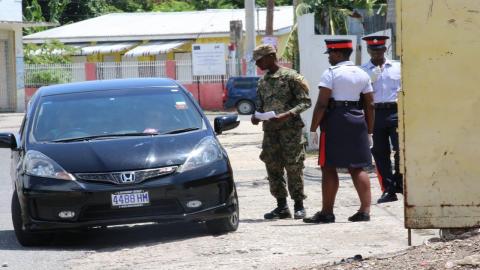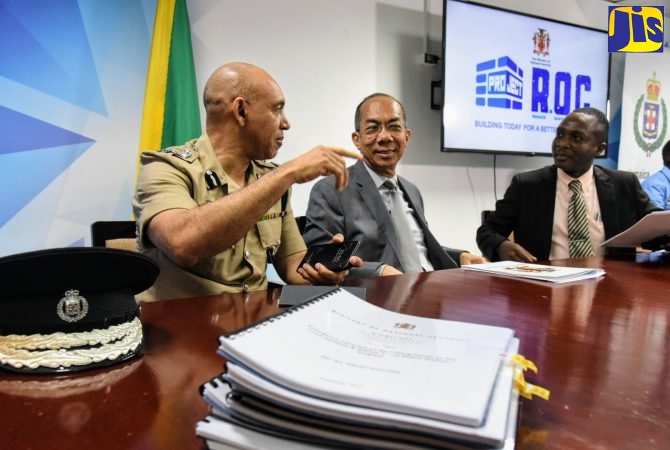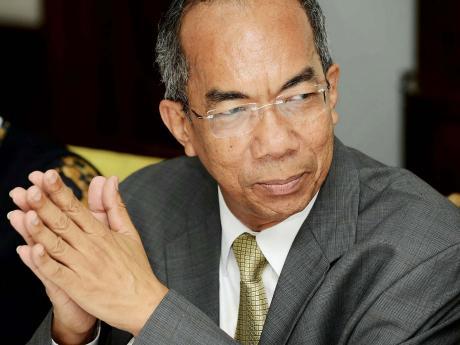
You are here Home » 2018: Security forces take Loop Ja ‘Personality of the Year’ title 2018: Security forces take Loop Ja ‘Personality of the Year’ title
As 2018 comes to a close, many Jamaicans, despite lingering concerns, are breathing a collective sigh of relief about continued reductions in serious crime figures nationally.
Police statistics have shown that from January 1 to December 15, a total of 1,234 murders were recorded across the island.
The figure represented a 22.2 per cent drop from the 1,587 murders that were recorded in 2017.
Broken down, this was 353 fewer murders year-on-year.
There were also reported significant reductions in rapes, shootings and some other more serious illegal activities.
Lawmakers have since attributed the general success to a number of initiatives, including states of emergency (SOE) and Zones of Special Operation (ZOSO) that were imposed in several police divisions and hotspot communities across the island this year.
While many persons are celebrating the ‘turnaround’ and hoping for the best for 2019, not a lot of attention is being paid to members of the island’s security forces and the all-round contribution that they made to make the crime-fighting initiatives as effective as they have been.
Also, the fact of no report of any major act or acts of indiscretion on the part of the combined police/military execution of the SOEs and ZOSOs has been a huge feather in their cap.
One of the most heavily criticised groups of persons nationally for 2018, members of the security forces, with limited resources and sometimes very limited motivation, have nonetheless, held firm to their resolve to restore order in a society where criminals have so often threatened to ‘take over’.
Examples over the year that pointed to the security forces’ levels of professionalism included the many breakdowns in discussions between the Government and the Jamaica Police Federation over improved wage and fringe benefits for rank and file members of the police force.
Despite the discussions not going favourably for the police for almost the entire year on the back of a similar position and even more differences from the year before, the members of the Jamaica Constabulary Force (JCF) this year carried out their duties steadily to significantly keep at bay, criminals who were threatening to wreak havoc in several communities.
Amidst it all, the question of a standard 40-hour work week and overtime pay for work thereafter, for members of the JCF, remained unresolved, yet they continued to do their jobs with general effectiveness.
Even broad public criticism of the conditions of work for both police and military personnel on state of emergency or ZOSO duties, including meal provisions or allowances and overtime compensation, did not seemingly break the back of the security forces’ resolve to make a real difference in the best interest of national security, public safety and public order.
And the correctional service, another arm of the national security apparatus, had major challenges relative to the welfare of some of its members over the year, but by and large, the country’s penal system was kept intact, allowing for increasing and noticeable calm within the society, something which was far more pronounced in 2018 than other recent years.
While other public service groups like medical personnel and teachers came in for their share of public backlash, the security forces noticeably, were at loggerheads with not just one, but two, ministers of national security, in the form of Robert Montague, who the police force criticised for allegedly interfering in the operational responsibilities of the commissioner of police, and later, Dr Horace Change, who went on record to lash out at aspects of the operations of the JCF.
In one memorable instance, the previous Police Commissioner, George Quallo, came under intense public backlash from the then minister after traffic police fell down on their responsibilities and allowed an entertainment event to be hosted on the Palisadoes strip, the only land-based gateway to and from the Norman Manley International Airport in Eastern Kingston. The incident resulted in a massive gridlock that caused wide-scale national criticism and spotlight.
The development triggered a reaction from the then National Security Minister, Montague, who not only voiced his disgust about how the matter was handled, but also bluntly ordered that the commissioner provide a report about the incident and prepare for short-notice meeting with him on the matter.
The tone of the message to the commissioner triggered tensions within the JCF because plans for the meeting were reportedly made via the media
The development resulted in the Police Officers’ Association (POA), representing the officer ranks within the JCF, issuing a scathing rebuke of Montague for his own handling of the situation, and expressing full confidence in Quallo.
The POA said it was concerned about what was described as serious distractions from the management of major crimes in recent times, and accused the minister of directly interfering in the operational purview of the commissioner of police.
In a press release issued in January 2018, under the signature of chairman, Superintendent of Police, Catherine Lorde, the POA said the actions of Minister Montague were likely to derail law enforcement strategies to combat crime.
The POA expressed concern about the communication method that was reportedly being used by the office of the minister of national security to the commissioner of police, which was said to have been done through media engagements, which were said to have been coupled with direct interference by the minister in the operational portfolio of the commissioner of police.
The supposed interference by the minister was said to have included promotions within the JCF and the distribution of vehicles within the force.
Very noticeably, the executive of the POA made a decision to accompany the commissioner to the office of the minister of national security for the ‘Palisadoes meeting’, and waited until Quallo had exited from the discussions.
Despite all of those differences with the security ministry, and others like the subsequent description of some police personnel as glamorised security guards by Montague’s successor, Chang, the JCF’s membership continued to risk life and limb to execute their duties.
After a year that also saw some members of the JCF falling by the wayside under various circumstances, including violent criminal attacks, the service delivery from the group continued to be positive.
In one stark case in point in June, Senior Superintendent of Police, Dermot Lawrence, of the Area One Police in western Jamaica, reportedly committed suicide.
Reports are that the senior lawman was found hanging by a piece of rope from a ceiling in his home at Mango Valley near Montego Bay in St James sometime after 7:30 p.m.
Lawrence was in charge of administration at the Area One Police Headquarters in Montego Bay.
Reports are that a friend discovered the shocking development upon visiting the lawman’s home, and summoned the police.
It is understood that Lawrence may have been experiencing domestic challenges, and only a day earlier, an action of his drew the attention of the police when gunfire was heard at his home where he was on leave from work.
He reportedly indicated to police who responded that his firearm accidentally went off,
There was even more sad news for the JCF’s membership and the nation at large after District Constable Melissa Edwards-Whyte was allegedly hacked to death in a case of domestic abuse, showing that while going above and beyond the call of duty to serve, protect and reassure the country, security force members are not immune to the crime problems plaguing everyday citizen.
This was also demonstrated in other instances where there were multiple armed attacks and injuries to members of the Jamaica Defence Force (JDF), both on and off duty, in places like Linstead and Spanish Town in St Catherine, and in St James, amid ongoing states of emergency.
Bearing in mind the intense minutely, hourly and daily challenges that are faced by the members of the overall national security forces, the group easily emerges as Loop News’ top ‘Personality of the Year for 2018’.
- Loop News
RELATED POSTS










admin